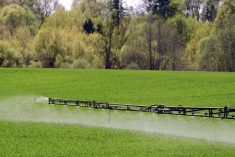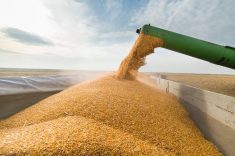Moscow | Reuters — Russian farming conglomerate Rusagro Group hopes the state will help it boost pork output to replace Western imports banned in tit-for-tat moves over Ukraine, but is still waiting for funds from a previous subsidy program.
Its situation highlights the broad scramble for state funding in Russia as U.S. and EU sanctions over Moscow’s role in the conflict restrict access to Western capital markets.
Maksim Basov, chief executive of Rusagro, saw a silver lining in the East-West tensions for the firm, which wants to export pork, sugar and vegetable oil to China while seeking to rise from the No. 3 to No. 2 position in the Russian pork producers’ ranking.
Read Also

Alberta crop conditions improve: report
Varied precipitation and warm temperatures were generally beneficial for crop development across Alberta during the week ended July 8, according to the latest provincial crop report released July 11.
Moscow banned pork imports from the European Union on health grounds in January as Ukraine began moving out of Moscow’s orbit. The move fuelled prices and opened up to 30 per cent of market share well before its broader EU food ban in August, although Brazilian pork filled part of the gap.
“The difficult geopolitical situation has an indirect positive impact on us – through a weaker rouble and the government’s readiness to support projects aimed at import substitution,” Basov said in an interview.
The company needs interest rate subsidies to help it double pork output in the central Tambov region — a project worth an estimated 14 billion roubles (US$377 million), as well as fund plans for exports to Asia, he said.
“Without interest rate subsidies projects do not break even. This is why we are not taking loans now, we are using our own cash. If the government decides to support large projects, they will be implemented.”
But he said the government had not yet compensated it in full under a previous interest rate subsidy program.
“I hope we will get paid compensation for (interest on) our old loans by the end of the year and (the government) will approve new (projects eligible for interest rate subsidies).”
He has the backing of the agriculture minister but it is not clear where the government stands amid stream of similar requests from sectors ranging from energy to banking.
China, Japan
Rusagro Group, listed in London as Ros Agro and controlled by senator Vadim Moshkovich’s family, lies just behind privately-held Miratorg and Cherkizovo in terms of pork output and is the second-biggest sugar producer.
With production centres in the central Tambov and Belgorod regions, Ros Agro plans to create a third one – in the country’s far east — a region bordering China that the Kremlin wants to develop to stop people seeking a better life elsewhere.
The project in Russia’s Primorye region, where Ros Agro wants to produce pork, margarine and sugar, is estimated to cost around 60 billion roubles, Basov said, of which 13 billion roubles has been approved, allowing it to produce 70,000 tonnes of pork a year for the Russian market.
“It will take three years to launch production,” Basov said. “We can increase production to one million tonnes if the Chinese market opens up for us. These are medium- and long-term plans.”
The Russia-China investment commission was discussing market access on Tuesday but there was no immediate word on the talks.
Basov said Rusagro could build a plant producing one million tonnes of raw sugar for the Chinese market and was targeting it for sales of margarine and other fats too.
Last week, the company said it had agreed to buy more than 20,000 hectares for pig-breeding facilities, a slaughterhouse and a fodder plant in the Primorye region and bought a minority stake in a soy processing and fats and oil producing plant there, with an option to get control and boost capacity.
Ros Agro is also considering launching an aquiculture project in the far east to export fish to Asian markets including Japan, Vietnam and the Philippines once they gave permission, Basov said.
Iran is another priority destination: the company may build a transhipment terminal in Iran’s north and ship its products, firstly vegetable oils, via the Caspian Sea.
— Reporting for Reuters by Olga Sichkar in Moscow; writing by Maria Kiselyova.














